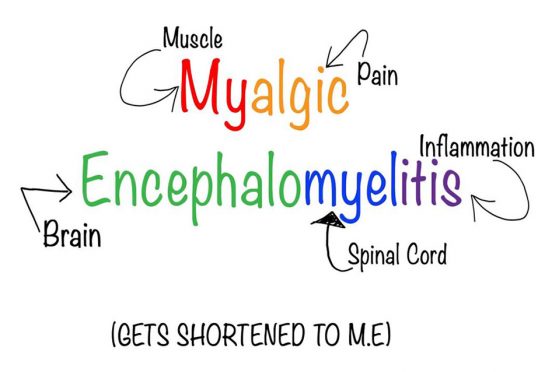How We Can Help
Young People
What Is Myalgic Encephalomyelitis?
Myalgic Encephalomyelitis (M.E) is a complex disease that can affect anyone at any age. It can affect people in many different ways, everyone has M.E symptoms that vary. It often takes a long time for people with M.E to learn how to cope and to manage their symptoms and unfortunately there is no cure or quick fixes.
M.E is not just being tired all the time, it is physiological – not psychological, it is not depression and it is not “all in your head”!
M.E STANDS FOR “MYALGIC ENCEPHALOMYELITIS” (PRONOUNCED MY-ALGIC EN-KEFF-ALLO-MY-EL-LTIS)
It’s an impressive way of saying that you have muscle pain and inflammation of the brain and spinal cord.

Common Questions
FAQS
What Causes M.E?
There is no evidence as to what causes M.E, even doctors and medical researchers are still unsure of the cause.
However, M.E may occur following a viral infection, poor immune system, environmental factors or a combination of different reasons.
Research is currently being carried out to find out the cause.
Is M.E Contagious?
No, M.E is not contagious therefore there is no reason to be worried that someone might catch it from you.
When Will I Get Better?
This can vary for everyone living with M.E. Some people can recover after a few months, for others it may take years. The good news is that younger people do tend to have a higher recovery rate compared to adults.
What Can I Do To Get Better
There are several steps that may help you be able to manage your symptoms such as;
Pacing yourself- this has been found to aid recovery, this means; Don’t overdo things
Don’t overdo things Rest as much as possible
Rest as much as possible Be patient and listen to your body
Be patient and listen to your body
What Are The Symptoms of M.E
M.E has many different symptoms however you are unlikely to experience them all at the same time.
What Are The Symptoms of M.E
Exhaustion after doing any physical or mental activity
This is referred to as post-exertional malaise (PEM), meaning that you may feel exhausted after doing a small task, like homework or walking to or from school or even watching the television.
You will need to make sure you get plenty of rest; you may find that you will run out of energy quicker than healthier people.
It is similar to a broken phone battery; you won’t be able to hold a “charge” as long as your friends or siblings.


Sleep Disturbance
You may find that sleep is not refreshing, after sleeping hours you may still feel very tired. Sleep reversal is also common in younger people with M.E, though we are not sure why.
With sleep reversal you are likely to find yourself being awake most of the night and sleeping late into the day. Feeling exhausted but not being able to sleep is also a symptom.
Poor Memory and Concentration
This can present itself in numerous ways, you may have trouble thinking about the right word to use or find it difficult to read and process information. Or you may feel completely exhausted after thinking or concentrating.
This can be very frustrating, but just remember it’s a symptom of your illness and does not reflect on your ability.
Tip: Break up any activities such as homework into small chunks


Aches and Pains
M.E can cause muscle, joint and nerve pain. This can be very hard to tolerate especially if it’s ongoing. Make sure your doctor knows of how much pain you are in so they can make sure you are getting the right medications/treatment. Other symptoms include:
- Dizziness
- Feeling too hot or too cold
- Headaches
- Upset Stomach
- Light/Noise sensitivity
- Sore throats
- Sore eyes and ears
- Shortness of breath
- Food Intolerances
- Weight gain/loss
- Poor appetite
Coping with School
Depending on the severity of your M.E staying in full time education may not always be possible.
This can be incredibly frustrating, however pushing yourself to keep up with peers and the pressures and demands of school could result in setbacks and a longer recovery time. This is something that you want to avoid at all costs.
There are options available if you cannot manage full time education, these could include a reduced timetable or home tuition. These options will need to be discussed and arranged between your school, doctors and Education Authority.
Making sure your teachers are aware of M.E if you do attend school is hugely important. This will allow your teacher to understand why you may need a break or if you are unable to take part in particular activities.

Many of our younger members were unable for full time education, however they have consistently found ways to catch-up with their peers. It is not uncommon for our members to get their GCSE’s and A-Level’s at an older age, then go onto further education or full time employment.
There are a range of routes open for continuing your education at all ages.
Contact us for information on what path might be right for you

Coping with Isolation
M.E suffers sometimes feel very isolated due to the nature of the illness. It is very common to feel this way if you’re not feeling well enough to go to school or see friends. Luckily, it is now so easy to keep in touch with friends online.
One of the great benefits of joining M.E Support Northern Ireland is that you don’t have to explain to anyone how you’re feeling as they are all going through something similar.
Helping your Friends Understand your Illness
It is important to let your friends know how you are feeling. It is difficult for someone who doesn’t have M.E to understand how you feel. You may suggest that your friend comes over to your house to watch a movie or have a chat instead of going out.
Let them know that sometimes you may have to cancel plans or say no due to your illness. By doing this it will help them understand and they will perhaps rearrange for a time when you are feeling more able.

Your Legal Rights
Generally, anyone aged 16 or over is entitled to consent to their own treatment. Like adults, young people (aged 16 or 17) are presumed to have sufficient capacity to decide on their own medical treatment, unless there’s significant evidence to suggest otherwise.
Children under the age of 16 can consent to their own treatment if they’re believed to have enough intelligence, competence and understanding to fully appreciate what’s involved in their treatment.
This is known as being Gillick competent.
Otherwise, someone with parental responsibility can consent for them.
Regardless of your age you have the right to be treated with respect by any medical professionals & care workers. You also have the right to take part in any decisions being made by your parents, doctors, care workers and to be made fully aware of why certain decision are being made.
You have the right to have someone with you when visiting your doctor and you also have the right to talk to your doctor alone, away from parents.
You have the right to have parents with you in hospital. If a nurse or doctor argues with you remind them of your rights.
You have the right to refuse treatment options, however if the doctor and your parents think there is a substantial risk to your health this may be overruled.

What Are The Symptoms of M.E
If a young person refuses treatment, which may lead to their death or a severe permanent injury, their decision can be overruled by the Court of Protection.
This is the legal body that oversees the operation of the Mental Capacity Act (2005).
Ideally, you, your parents and your doctor will all work together to provide you with the best care. However, if you feel that the wrong decisions are being made contact M.E Support Northern Ireland and we can advise you on what services are available.
Support Group
M.E Support Northern Ireland has dozens of young members who are all keen to chat to each other, whether that be in person or online. Support from people suffering with M.E who are a similar age to you can make a positive impact with coping with M.E.
Contact us for more information: info@mesupportni.com

